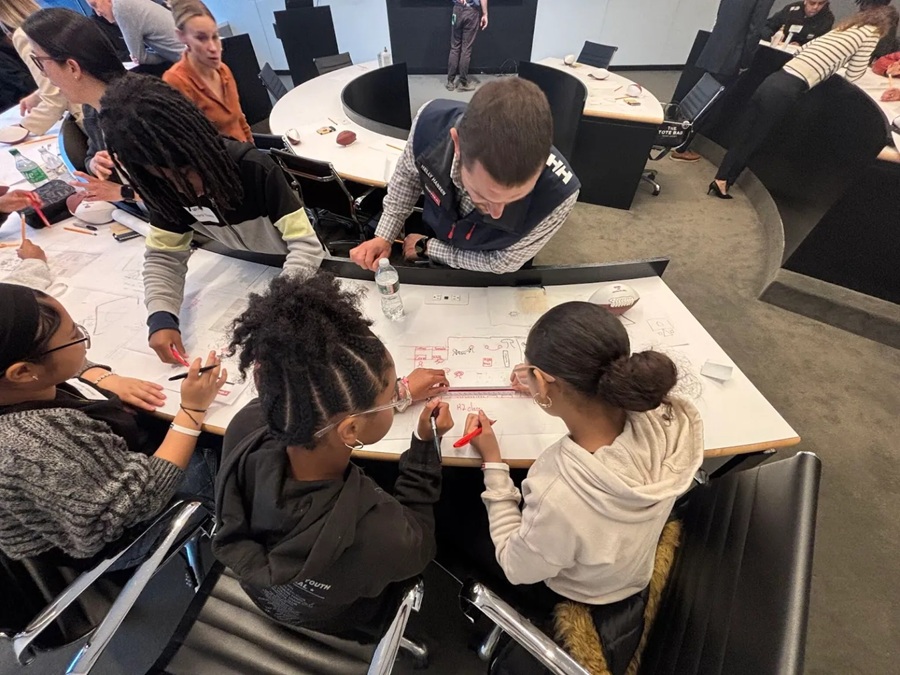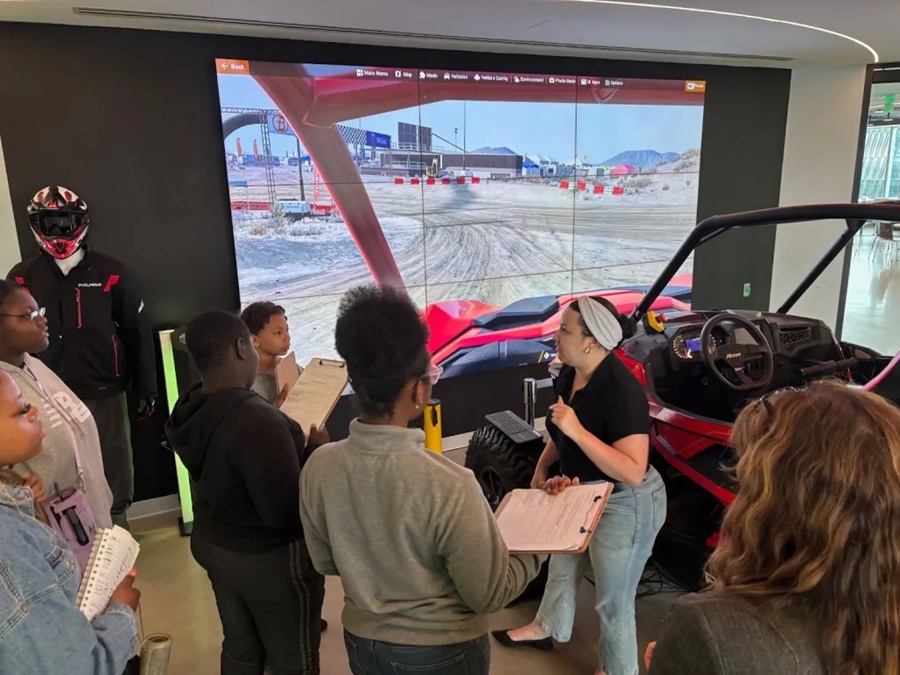Students need to learn the ‘durable skills’ crucial to the world they’re growing into
Academic skills and career-connected learning are both crucial

UP Academy Dorchester students work with professionals at Suffolk Construction, the largest construction company in Massachusetts, to make design changes for the school’s peace garden and farm stand. (Photo courtesy UP Education Network)
SEEING CHAYCE’S BASHFUL SMILE and prideful glow as he and his lab partner worked for an hour straight to design a winning pill prototype at Vertex Pharmaceuticals will stick with me for a long time. So will Yari, telling me that she is going to pursue entrepreneurship and applied to a more rigorous high school after visiting Pillar VC.
If you spend any time with middle schoolers, you know that this is what impact looks like in action.
Students deeply engage and are deeply affected when the task at hand is relevant, and they can see the connection to their futures. As a former teacher, school leader and now leader of a school network, I believe it is imperative that we prepare students for both college and career by pairing academic rigor with what the real world demands: durable skills and career-connected learning.
This work isn’t theoretical. UP Academy Dorchester and UP Academy Holland— preK-8 and preK-6 public schools serving students furthest from opportunity—deliver immersive, career-connected learning without sacrificing academic expectations. Our “Path and Potential” work deepens student engagement and strengthens skills like collaboration, critical thinking, and resilience—skills that matter in any high school, college, or career setting.
Durable skills include communication, teamwork, problem-solving, and self-direction. These are the skills that allow students to apply what they know—and they’re exactly what today’s employers are asking for. According to a recent analysis, 66 percent of job postings in Massachusetts called for at least one durable skill, often at rates far higher than technical or hard skills.
Although Massachusetts does acknowledge and lay out ways all students can engage in work-based learning and requires work-based learning for Career Technical Education programs, it does not have a complete framework or clear expectations for work-based learning outcomes for all our schools.
Equipping students with these durable skills and exposing them to career opportunities should start early. Giving kids in elementary grades a taste of what professional opportunities are open to them can spark their interest in pursuing these careers. It’s a simple way to match students’ interests with pathways to success that are available to them – much like schools that name classrooms after colleges and hang college banners on their doors tell children that a college education is attainable.
These skills need to be embedded across a school’s curriculum, and extended through experiential learning. Whether students are designing a peace garden alongside professionals at Suffolk Construction, working with mentors from Bitsight to understand cybersecurity careers, or exploring how AI can be used to help their community with the team at Dell, they are seeing themselves in futures that would not have been visible to them if not for these experiences.
While the prevailing belief seems to be that developing partnerships between schools and the private sector is a major barrier, we haven’t found that to be the case. In the past year alone, 285 UP Academy students—from 5th through 8th grade—participated in immersive experiences with 18 local companies. Each homeroom was matched to a STEM-related partner, allowing students to explore professional environments, meet adults doing inspiring work, and begin building the social capital that fuels future success.

UP Academy Dorchester students take notes during a discussion with a software designer at Boston-based PTC, which provides software solutions for manufacturers to design, develop, and manage their products. (Photo courtesy of UP Education Network)
The structured “Imagine Your Future” experiences and mentorship programs offered are not one-offs. They are thoughtfully designed, embedded in the calendar, and aligned to academic and social-emotional goals. These aren’t field trips—they’re foundational. Our partners in this work have been willing to thoughtfully co-design experiences that are developmentally appropriate, highly engaging, and, of course, fun.
Too often, students from under-resourced communities are told to dream big but aren’t given the tools to make those dreams real. Equity means ensuring every student builds the academic skills and the durable skills needed to succeed. It means giving them sight lines into real-world careers and instilling the confidence to pursue them.
We don’t have to choose between high expectations and real-world relevance. As the Commonwealth reexamines its graduation requirements and considers the future of assessments like MCAS, we have an opportunity to broaden the definition of success. Academic achievement should remain a cornerstone. But if we want to prepare students for their future—not ours—we must elevate durable skills and career-connected learning as co-equal pillars of rigorous education.
Hillary Casson is the CEO of Up Education Network, which operates two public schools in partnership with the Boston Public Schools – UP Academy Dorchester and UP Academy Holland.
Commonwealth News Service
